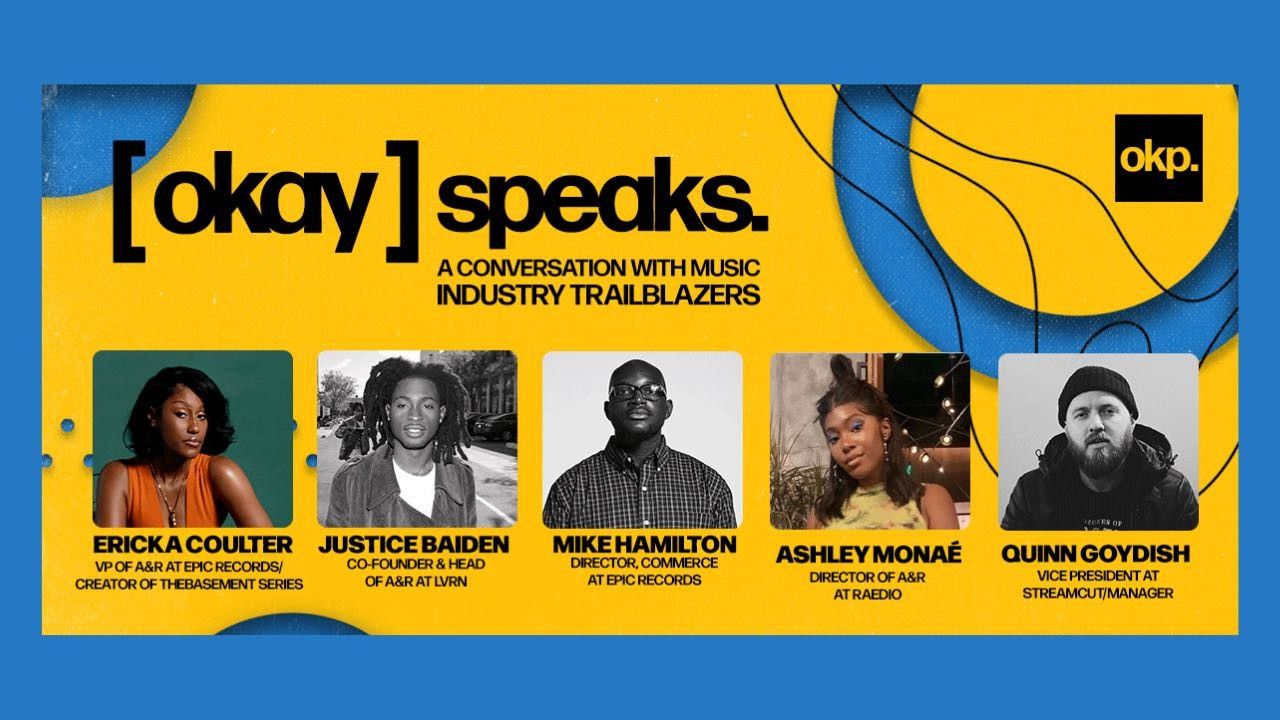[okay] speaks: 5 Music Industry Trailblazers Tell Us What It Takes to Break an Artist
In our first-ever [okay] speaks panel we heard firsthand how music industry insiders are coping with the COVID-19 pandemic.
In a recent feature, we explored thereal-life experiences of freelancers in various fields and how they’ve been impacted by the COVID-19 pandemic. Since we’re all still coping with quarantine and the effects of coronavirus we decided to take things a step further by live-streaming a panel, [okay] speaks: A Conversation With Music Industry Trailblazers. The discussion featured Ericka Coulter, Justice Baiden, Quinn Goydish, Mike Hamilton, and Ashley Monaé — music executives who offered their expertise on breaking emerging talent. Additionally, they candidly expressed how they’re adapting to the shift to video, their thoughts on streaming numbers, and how they believe artists should go about garnering fanbases. They also offered their opinions on social media platforms including TikTok, OnlyFans, Instagram and Twitch.
Read on to get the top four tips from the panel that addresses how the COVID-19 pandemic is impacting the music industry from executives we respect.
1. Conquering uncharted territory in the industry will require shifting to newer platforms.
“We’re having to learn how to use new methods of communications,” Quinn Goydish, Vice President at StreamCut said. Goydish believes a lot of artists are familiar with Instagram, but because of the COVID-19 pandemic platforms like Twitch have started to become more popular. Justice Baiden, LVRN co-founder added he’s been forced to learn TikTok and he’s currently aiming to understand OnlyFans, he believes it’s a “direct-to-consumer platform.” We also asked Mike Hamilton, Director of Commerce at Epic Records for his thoughts on Travis Scott’s viral Fortnite concert which reportedly attracted 12.3 million viewers. He shared the unique experience spoke directly to Scott’s younger fans. “It was one of those perfect situations where an artist and a platform [matched].”
2. Relying on your passions can turn into a career pivot you didn’t see coming.
When reflecting on shifting from writing and editing,Ashley Monaé, Director of A&R atIssa Rae’sRaedio shares exactly how she pivoted a few years ago into the music industry. Not only did she trust her gut, but it took words of wisdom from a mentor to realize she could move on from the editorial space. Because she had a taste in R&B and hip-hop, her mentor encouraged her to follow that innate love for music and it’d transform into a viable career as an A&R. In the past, she was a Contributing Editor at VIBE and an Assistant Music editor at BET. Monaé also penned stories for Billboard, Pitchfork, and more. Notably, she wrote a Travis Scott cover story for Paper magazine. She noted during the panel that her written work led her to thrive in the music industry since artists create “conceptual projects and albums” that are based on emotions and feelings. Ashley expressed this is similar to her past work in editorial which thrived off the feelings evoked from music.
3. In the wake of social distancing, quarantine, and the pandemic there are no limitations to entering the music industry.
“My advice for striding up in the music industry is there is no blueprint,”Justice Baiden, co-founder and Head of A&R atLVRN said. When we asked him about getting in the industry, he expressed that the team at LVRN didn’t wait for an opportunity. Rather than waiting, they pushed artists to the forefront of discussions in the digital space who resonated with their fan bases on their own including DRAM, Summer Walker, and 6LACK. For aspiring artists and music executives, he shared it’s important to realize that being resourceful will get you far rather than using excuses to hold you back. Baiden added, right now artists shouldn’t be working on getting the attention of labels. Instead, they should understand garnering their own fan base will bring the attention they might be seeking. The biggest takeaway we received from Baiden’s advice is in order to flourish you might have to create your own company, produce and release your own music instead of waiting for the approval of larger brands or labels.
4. To stand out without networking events, dinners and more — it’s ok to shoot your shot via email.
Ericka Coulter, Vice President of A&R at Epic Records shared towards the end of the panel she’s recently been receiving emails from aspiring music executives. Coulter admitted she reads them and finds herself intrigued by the notes and encouraged those just starting out to keep emailing. She also said she stops and reads if they’re offering new music she should listen to or have something creative to offer. “My advice for interns is if you’re going to email every day, come with something,” she said. “You’ve come this far so you might as well deliver,” Coulter said. On her origins in the industry, she noted she was initially uncomfortable when she moved to Los Angeles from Kansas because she was alone and new. Yet, she knew the uncomfortable position she was in would pay off since she had tunnel vision. “Figure out what your story is going to be, while we’re all in this thing together, give yourself time to process what that is. So that when you come out of it you’ll know exactly what direction you want to go,” Coulter said.
Watch the entire panel below.
